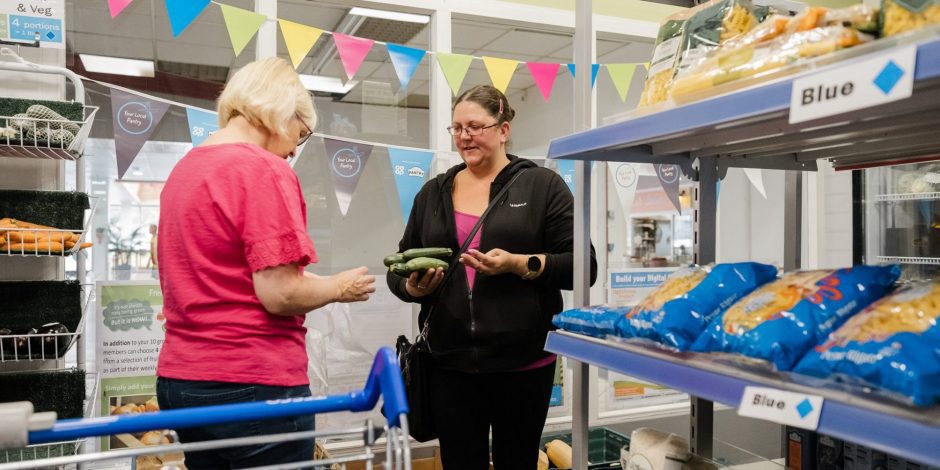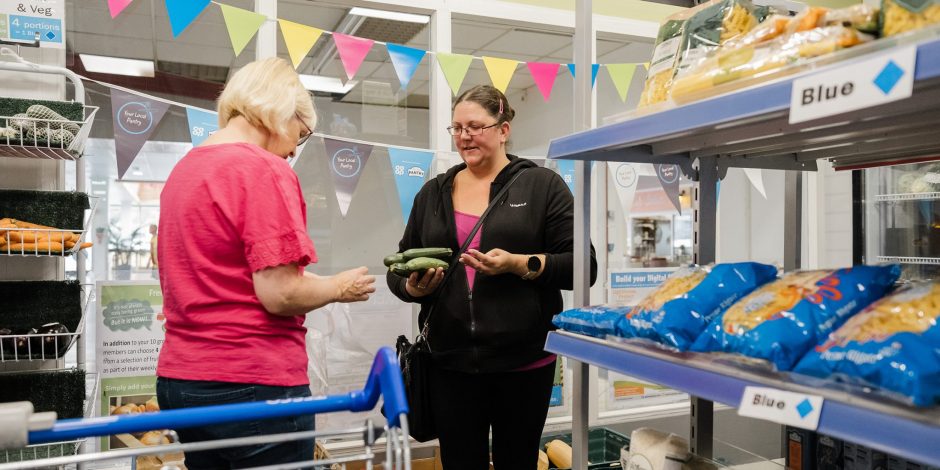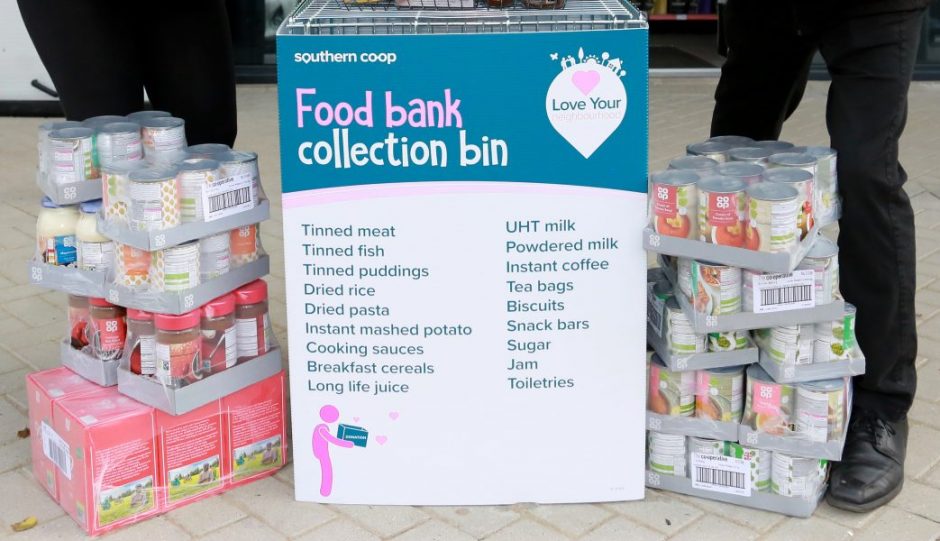With food inflation at 16.8%, the festive season was a challenging time for UK households. After a 41-year high in October 2022 (11.1%), inflation in the UK began easing in December but remains high at 10.5%.
In this context initiatives like Cooperation Town, a network of community food co-ops, organising on streets and estates across the UK, are becoming increasingly popular. Launched in 2019, Cooperation Town has grown to include 21 food co-ops.
“Anyone could start a food co-op on their streets or their estates and they don’t need to have any particular background or knowledge or experience to be doing this,” says Shiri Shalmy, one of its founding members.
All groups are self-organised, she adds, which means that there may be even more co-ops not formally affiliated to Cooperation Town. “Once a co-op is too big, there’s a waiting list and so the co-op splits and people support each other to organise so they don’t need us to come and introduce the model – there are already community organisers and they can support their neighbours organise. So it’s a proliferation and a self-organising transmission built into it.”
Meanwhile, the actual worker co-op behind the project employs five workers and one project worker who is not a member.
“We have seen an increase in the number of food co-ops, more people are asking to join co-ops or starting co-ops,” says Shalmy, although this could be down to more people finding out about their work.
The cost of living crisis has had an impact on the food co-ops that form part of the network, with purchasing power dropping. However, Cooperation Town food co-ops can still help members save up to 30% on food prices.
“Because our model is based on purchasing in bulk, and supplementing that with surplus food, which is free in London, we are able to maintain that level of saving,” says Shalmy. “So co-ops and their members still save a lot of money. Outside of London, it is a slightly different ratio because there is less free surplus food so co-ops have to pay the surplus food distributors. But they still make a big saving.”
The crisis has also led to small grants being made available to community groups looking to make a difference, such as Cooperation Town food co-ops. She adds that while this has helped, small grants by themselves cannot solve the cost of living crisis.
One of the most recent initiatives led by Cooperation Town is the Gospel Oak Living Room, a warm hub where neighbours can spend time different times of the day. The hub is a partnership between them and tenant residents associations.
Shalmy, who has a trades union background, says she wanted to explore organising outside of the workplace community organising but also thinking about social production – and came across the co-op model.
“I had no co-op background, so I didn’t know I had to teach myself – I’m still learning,” she says, adding that having conversations with some of London’s most well-known worker co-ops, such as Calverts and Outlandish also helped. “People in the movement were very supportive and helped us, and we’re always chatting to people at Calverts or at Suma or other co-ops. You really get a sense that the principle of co-operation between co-ops is real and it proves itself to be super useful.”
Did they expect the model to take off in the way it did? “When we started the project we didn’t know that it would be anything like that,” says Shalmy. “We never imagined that we would be employing five people or six people and supporting so many people to self-organise.
“It started as an experiment. So it’s very encouraging that it grew so spontaneously and so nicely and that we were able to respond to something like Covid-19 whereas it could have, completely killed this project. It actually gave us time to develop and to experiment, but also meant that we could answer really crucial need at the time when it was happening.”
As to the future, Cooperation Town plans to continue its work and has secured funding to keep going for the next two years. Shalmy expects the number of co-ops within the network to double by 2024.
Other co-ops have also taken a series of measures to support their members, customers and employees with the rising cost of living. In November 2022 the Co-op Group teamed up with Your Local Pantry, a network coordinated by Church Action on Poverty, which helps people enjoy big meals on smaller budgets.

The Local Pantry creates spaces for communities to come together around food. Each pantry within its network stocked with surplus food. With small weekly amount of around £3.50 (depending on location), those using the pantries can select at least ten items from a wide selection of groceries, meaning that they save on average £15 per shop. The partnership with the Co-op Group is helping to triple the number of Pantries in the UK, from 75 to 225 over the next three years.
Rebecca Birkbeck, director of community and membership at the Group said at the time: “Things are tough for many of us at the moment and we are proud that pantries will be there to support people and their local communities in dealing with the challenges that are thrown at them, it feels like a real step in the right direction to make the world that little bit fairer.”
James Henderson, network development coordinator for Your Local Pantry, says: “Communities have long wanted to improve food security while upholding dignity, choice and hope, and Pantries are a proven win-win solution. We’re really excited to be teaming up with the Co-op, so another 150 neighbourhoods can open pantries of their own.”
To tackle food waste the Co-op Group also launched Caboodle, a new tech platform designed to stop food waste. Caboodle, which was developed in partnership with Microsoft, connects retailers, cafés and restaurants to community groups and volunteers to redistribute surplus food to the households most in need.

Meanwhile, Channel Islands Co-op partnered with Jersey Evening Post to promote recipes created by local chefs with ingredients costing a total of less than £5 using their co-op honest value and co-op own brand ranges.
A similar initiative is run by Waitrose, part of employee-owned John Lewis Partnership. In September 2022 the food retailer launched ‘Super Saver recipes‘ for under £2 per portion meal inspiration. The retailer also ran a Great Saving Event in January with offers across thousands of staple products.
Leyla Page, commercial planner at Waitrose, says: “With the cost of living crisis, we know customers are keener than ever to find a good deal. That’s why we introduced ‘Waitrose Ways to Spend Less’, highlighting value-for-money deals that customers can take advantage of all year round.”
A survey of 2,000 UK adults commissioned by John Lewis and Waitrose found that many households aimed to save money on bills when cooking their Christmas dinner, with nearly a fifth planning to use an air fryer and a similar number looking to use a microwave (18%) and cook more on the stove to reduce oven time (18%). The research revealed that only 12% of respondents expected to have the heating on for longer over Christmas, with a quarter (26%) planning to use it less.
An analysis by the Joseph Rowntree Foundation found that a fifth of the 2.5 million low-income households were going without food and heating in November. It revealed that over 3 million low-income families could not afford to heat their homes to protect themselves from the cold.

In response to these concerns, in December the Co-op Group became first retailer to launch a match-funding platform with Crowdfunder to provide support to local community organisations across the UK, helping people cope with rising energy costs during the cold winter months. Since the Warm Spaces match funding platform launched, over £240,000 has been paid out by the Group to help 300 groups provide warm spaces in communities across the UK. On 19 January the Group announced it would increase the flow of funds to community groups through its £1m Warm Spaces funding boost.
“Launching this funding boost will help groups keep their lights and heating on as they bring communities together to keep warm in the coldest months of the year,” says Birckbeck, “increasing overall wellbeing. It may also mean people don’t have to choose between accessing food or heating this winter. Plus, having a warm space allows the community to take a break from their everyday worries, improving their mental wellbeing.”
Sue Collins, Caxton House Community Centre, a multi-purpose community hub in North London, adds: “We have lots of different activities on different days that include arts and crafts, as well as access to advice including money saving energy tips, budgeting and debt advice, mental health and wellbeing support. Residents can also charge electrical equipment and fill flasks, with some sessions allowing access to hot food, and pre-prepared meals that can be microwaved at home, saving having to put on an oven.”
Similarly, East of England Co-op donated £100,000 from its Christmas marketing budget to help people in its region keep warm and fed this winter. Of this, £70,000 was split among warm hubs with the remaining £30,000 being allocated to 25 local foodbanks.
Vicki Mann, manager of Chantry Library in Ipswich, one of the organisations to benefit, says: “We’re open as a community hub, where people can just come and be themselves and meet new people. It’s a warm space for people to come, which is needed at the moment, especially with the cost of living.”
The co-op’s members and customers helped to raise over £44,500. Kat Reading, community development manager at the society, says: “We’re blown away by the generosity of our customers this winter. We know that household budgets are extremely stretched, but our community has, yet again, pulled together to support each other.”
Many co-operative retailers have also taken steps to support employees cope with inflation. For example, the Co-op Group increased pay for all store-based employees, with hourly rates going up between 4.2% and 5.3%.
Co-op colleagues needing loans can also become members of the two credit unions associated with the Co-op – Keep Credit Union and the Co-op Credit Union or access interest-free rent deposit loans for employees which allows them to receive up to a maximum of 80% of earnings over a four-week period, with repayments taken direct from salary over the next 10 paydays after the loan is received. Other initiatives include partnering with StepChange to help receive help with debt.

Helping members during these difficult times was also a priority for the Southern Co-op. “As a co-op that works for the benefit of our communities, we have considered what we can do to help with the external pressures being faced by many,” says CEO Mark Smith.
Recognising the rising energy costs, the society made a one-off payment to all colleagues of £300, sent a £50 gift card to every colleague to support with the cost of food, and invested in enhanced colleague discount events including a 50% discount in September and December 2022.
“We hope these measures have gone some way in supporting our colleagues during these challenging times, and we’ll continue to review what other support we can offer during 2023,” adds Smith.
In addition to its ongoing support for food banks, local pantries and community fridges, Southern Co-op sent a £40,000 worth of gift cards to its local food bank partners, donated £25,000 to Neighbourly’s Warm Communities Fund and raised over £50,000 for its local food bank partners. The retailer has donated 2p every time its members buy food, drink and groceries in its food stores and scan their membership card.
With high inflation likely to continue, UK retail co-ops will have to continue to support customers and employees. Helen Dickinson, chief executive of the British Retail Consortium, warns that “while there is some indication that inflation may have reached its peak, prices will remain high in the coming months.”
Retailers are taking steps to support their customers throughout this cost-of-living crisis, she adds. “They are keeping the price of many essentials affordable, expanding their value ranges, raising pay for their own staff, and offering discounts for vulnerable groups,” she said.
Insight provider IGD Retail thinks retailers will have to focus on “driving out costs, improving the efficiency of supply chains and delivering value to consumers in new ways over the next 12 months”.
Toby Pickard, global insight leader at IGD, said: “While many of these initiatives from businesses have been reactionary, they are helping retailers to reset the cost base and develop go-to market models for the future.
“Alongside this, retailers will continue to progress their key initiatives centred on health and wellness, sustainability and digitisation. Progress in these areas is incremental but we predict it will drive significant long-term change in the shape of our industry.”